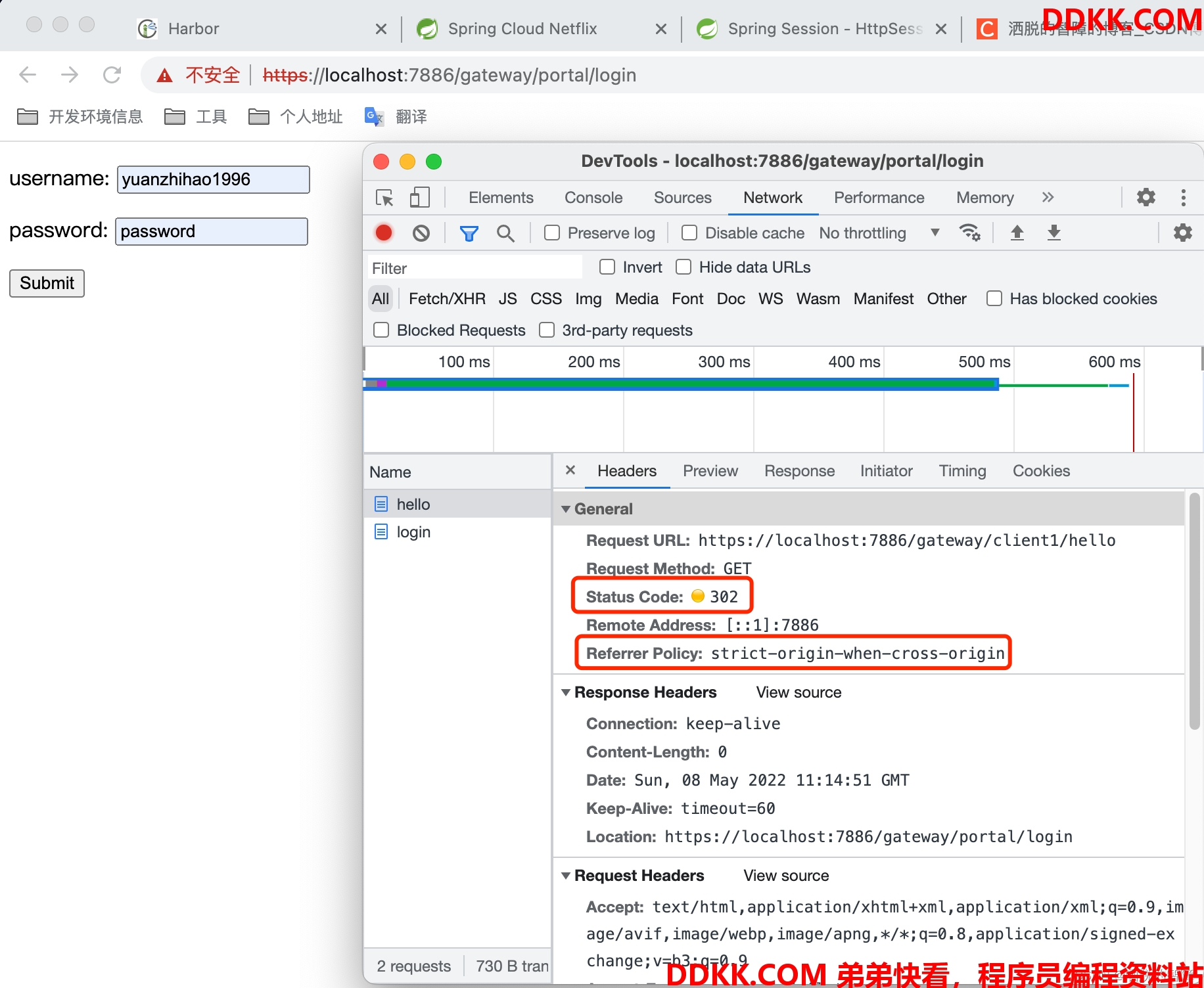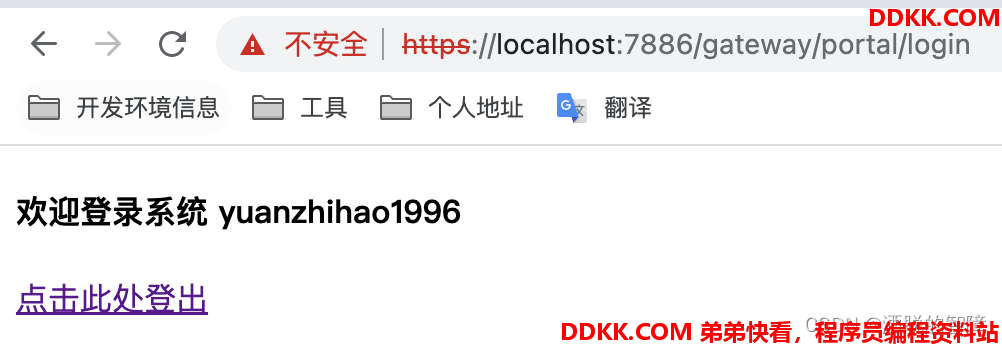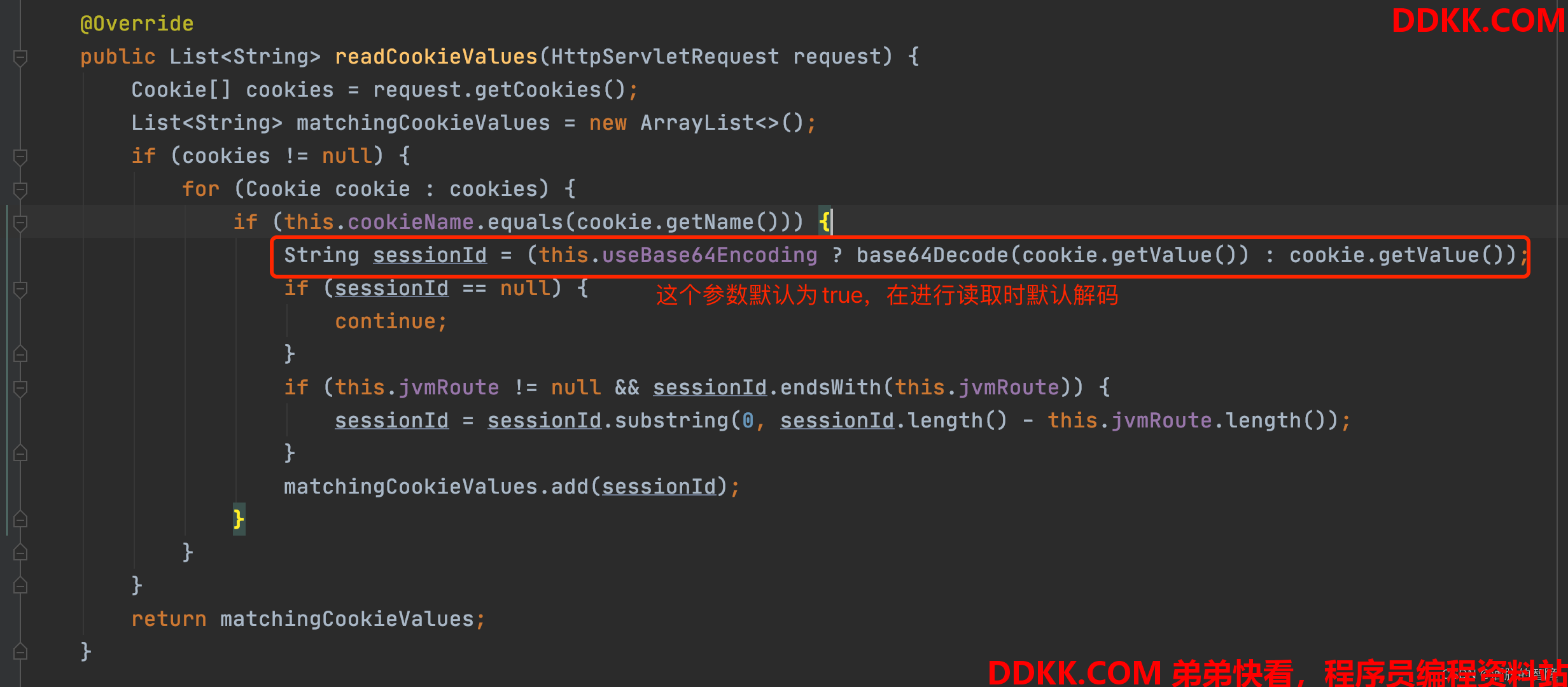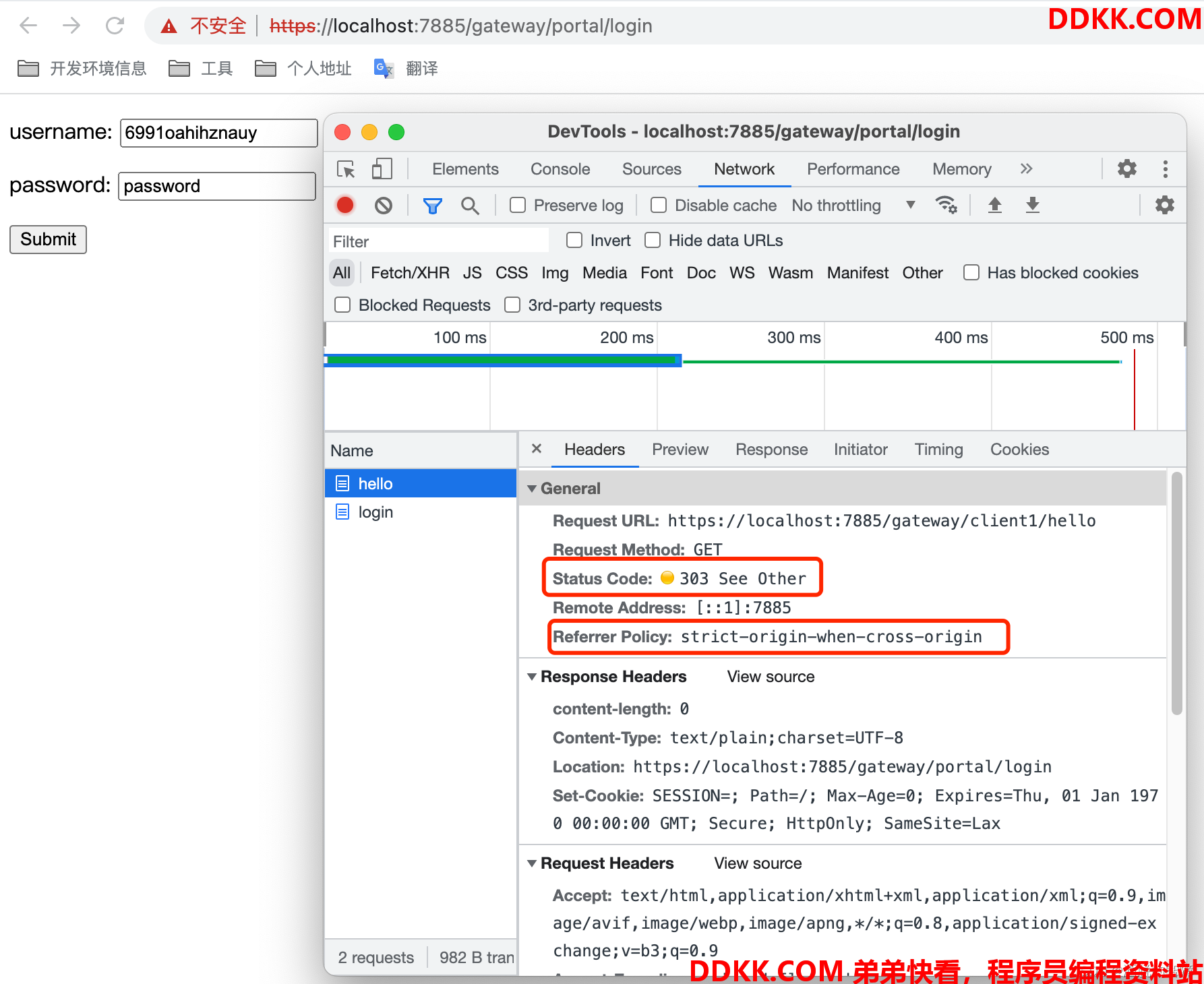在进行zuul切换到gateway时,需要重新实现session共享,本文主要分享一下自己实现的方案。
1、zuul中的session共享
在zuul中,是通过spring-session-data-redis这个组件,将session的信息存放到redis中实现的session共享。这次也简单说明下如何实现以及一些注意的点。
首先在网关zuul以及所有的微服务中添加spring-session-data-redis依赖:
<!-- session共享 -->
<dependency>
<groupId>org.springframework.boot</groupId>
<artifactId>spring-boot-starter-data-redis</artifactId>
</dependency>
<dependency>
<groupId>org.springframework.session</groupId>
<artifactId>spring-session-data-redis</artifactId>
</dependency>
之后添加redis配置信息:
spring:
redis:
host: localhost
port: 6379
添加EnableRedisHttpSession注解:
/**
* 指定flushMode为IMMEDIATE 表示立即将session写入redis
*
* @author yuanzhihao
* @since 2022/5/8
*/
@EnableRedisHttpSession(flushMode = FlushMode.IMMEDIATE)
@Configuration
public class RedisSessionConfig {
}
在网关zuul工程中,路由跳转到微服务时,需要添加sensitiveHeaders,设置为空,表示将敏感信息透传到下游微服务,这边需要将cookie的信息传下去,session共享保存到redis里面需要用到:
zuul:
routes:
portal:
path: /portal/**
sensitiveHeaders: # 将敏感信息传到下游服务
serviceId: portal
指定server.servlet.context-path路径:
server.servlet.context-path=/gateway
zuul测试工程
在我的代码库中,我提交了一个简单的demo,主要有四个工程,分别是网关zuul、主页portal、两个客户端client-1、server-1。
网关zuul中添加路由信息:
spring:
application:
name: zuul
redis:
host: localhost
port: 6379
server:
servlet:
context-path: /gateway
zuul:
routes:
portal:
path: /portal/**
sensitiveHeaders:
serviceId: portal
client-1:
path: /client1/**
sensitiveHeaders:
serviceId: eureka-client1
server-1:
path: /server1/**
sensitiveHeaders:
serviceId: eureka-server1
添加登录过滤器,对所有的请求进行拦截,对于没有登录的请求会自动跳转到登录页面:
/**
* 登录过滤器
*
* @author yuanzhihao
* @since 2022/5/8
*/
@Component
@Slf4j
public class LoginFilter extends ZuulFilter {
private static final List<String> white_List = Arrays.asList("/login", "/logout");
@Override
public String filterType() {
return "pre";
}
@Override
public int filterOrder() {
return -1;
}
@Override
public boolean shouldFilter() {
HttpServletRequest request = RequestContext.getCurrentContext().getRequest();
String requestURI = request.getRequestURI();
for (String uri : white_List) {
if (requestURI.endsWith(uri)) {
return false;
}
}
return true;
}
@SneakyThrows
@Override
public Object run() throws ZuulException {
RequestContext currentContext = RequestContext.getCurrentContext();
HttpServletRequest request = currentContext.getRequest();
HttpSession session = request.getSession();
UserInfo userInfo = (UserInfo) session.getAttribute("userInfo");
if (userInfo == null) {
HttpServletResponse response = currentContext.getResponse();
response.sendRedirect("/gateway/portal/login");
}
return null;
}
}
portal中简单实现了登录逻辑:
/**
* @author yuanzhihao
* @since 2022/5/8
*/
@Controller
public class LoginController {
@GetMapping(value = "/login")
public String login(HttpServletRequest request, HashMap<String, Object> map) {
UserInfo userInfo = (UserInfo) request.getSession().getAttribute("userInfo");
if (userInfo != null) {
map.put("userInfo", userInfo);
return "index";
}
return "login";
}
@PostMapping("/login")
public String login(UserInfo userInfo, HashMap<String, Object> map, HttpServletRequest request) {
// 设置session
request.getSession().setAttribute("userInfo", userInfo);
map.put("userInfo", userInfo);
return "index";
}
@GetMapping("/logout")
public String logout(HttpServletRequest request) {
request.getSession().invalidate();
return "logout";
}
}
在客户端client-1和server-1中可以请求到当前session中的用户信息:
@GetMapping("/hello")
public String hello(HttpServletRequest request) {
UserInfo userInfo = (UserInfo) request.getSession().getAttribute("userInfo");
return "Client1 Hello " + userInfo.getUsername();
}
未登录时,通过网关访问其他微服务页面会重定向:

登录后,可以正常访问,并且在其他微服务中可以获取到session中的用户信息:

client-1:

server-1:

2、gateway中的session共享
2.1、httpSession和webSession
首先spring cloud gateway是基于webflux,是非阻塞的,zuul是基于servlet的,是阻塞的(这部分差异大家可以自行了解一下,我也不是很熟~)。他们的session是两种实现,在zuul中是httpSession,而到了gateway中是webSession。
在gateway中需要将EnableRedisHttpSession注解换成EnableRedisWebSession:
/**
* 指定saveMode为ALWAYS 功能和flushMode类似
*
* @author yuanzhihao
* @since 2022/5/6
*/
@EnableRedisWebSession(saveMode = SaveMode.ALWAYS)
@Configuration
@Slf4j
public class RedisSessionConfig {
}
同时需要覆盖webSession中读取sessionId的写法,将SESSION信息进行base64解码,默认实现中是没有base64解码的,sessionId传到下游时不一致,会导致session不共享:
// 覆盖默认实现
@Bean
public WebSessionIdResolver webSessionIdResolver() {
return new CustomWebSessionIdResolver();
}
private static class CustomWebSessionIdResolver extends CookieWebSessionIdResolver {
// 重写resolve方法 对SESSION进行base64解码
@Override
public List<String> resolveSessionIds(ServerWebExchange exchange) {
MultiValueMap<String, HttpCookie> cookieMap = exchange.getRequest().getCookies();
// 获取SESSION
List<HttpCookie> cookies = cookieMap.get(getCookieName());
if (cookies == null) {
return Collections.emptyList();
}
return cookies.stream().map(HttpCookie::getValue).map(this::base64Decode).collect(Collectors.toList());
}
private String base64Decode(String base64Value) {
try {
byte[] decodedCookieBytes = Base64.getDecoder().decode(base64Value);
return new String(decodedCookieBytes);
} catch (Exception ex) {
log.debug("Unable to Base64 decode value: " + base64Value);
return null;
}
}
}
这边可以参考下具体的源码。httpSession在读取的时候,会进行解码,具体方法地址org.springframework.session.web.http.DefaultCookieSerializer#readCookieValues

2.2、添加context-path
spring-cloud-gateway不是基于servlet的,所以设置了server.servlet.context-path属性并不生效,这边参考其他人的方案使用了另一种方法添加了context-path。使用StripPrefix的方式。StripPrefix的参数表示在进行路由转发到下游服务之前,剥离掉请求中StripPrefix参数个数的路径参数。比如StripPrefix为2,像网关发起的请求是/gateway/client1/name,转发到下游时,请求路径会变成/name,这样就添加完成了context-path。
具体路由的配置信息如下:
spring:
application:
name: gateway
cloud:
gateway:
routes:
- id: client1
uri: lb://eureka-client1
predicates:
- Path=/gateway/client1/**
filters:
- StripPrefix=2
- id: server1Session
uri: lb://eureka-server1
predicates:
- Path=/gateway/server1/**
filters:
- StripPrefix=2
- id: portal
uri: lb://portal
predicates:
- Path=/gateway/portal/**
filters:
- StripPrefix=2
到现在差不多就完成了gateway的session共享。
2.3、gateway测试工程
这边测试工程和上面一致,只是将网关换成了gateway。
我们在gateway中添加一个登录过滤器拦截所有的请求,对于没有登录的请求跳转到登录页面:
/**
* 登录过滤器
*
* @author yuanzhihao
* @since 2022/5/6
*/
@Component
@Slf4j
public class LoginGlobalFilter implements GlobalFilter, Ordered {
private static final List<String> white_List = Arrays.asList("/login", "/logout");
// 登录地址
private static final String PORTAL_URL = "https://localhost:7885/gateway/portal/login";
@SneakyThrows
@Override
public Mono<Void> filter(ServerWebExchange exchange, GatewayFilterChain chain) {
System.err.println("login filter starter");
// 判断是否登录
AtomicBoolean isLogin = new AtomicBoolean(false);
exchange.getSession().subscribe(webSession -> {
UserInfo userInfo = webSession.getAttribute("userInfo");
System.err.println("userInfo is " + userInfo);
if (userInfo != null) {
isLogin.set(true);
}
});
// 这边添加一个延时, 等待获取到session
Thread.sleep(200);
// url白名单
String path = exchange.getRequest().getURI().getPath();
boolean isWhiteUrl = white_List.stream().anyMatch(path::endsWith);
// 登录状态或者在url白名单中 放行
if (isLogin.get() || isWhiteUrl) {
return chain.filter(exchange);
}
ServerHttpResponse response = exchange.getResponse();
response.setStatusCode(HttpStatus.SEE_OTHER);
response.getHeaders().set(HttpHeaders.LOCATION, PORTAL_URL);
response.getHeaders().add("Content-Type", "text/plain;charset=UTF-8");
return response.setComplete();
}
@Override
public int getOrder() {
return -1;
}
}
这边我添加了一个200ms的睡眠,因为测试验证的时候,当请求进入这个过滤器时,获取到的webSession是空,导致逻辑异常。猜测是由于spring-cloud-gateway是基于netty实现的非阻塞IO,所以获取session有一定的延迟,所有添加了一个sleep阻塞。后续会考虑修改。
之前也尝试过使用block()方法修改为阻塞的,但是抛异常了,具体原因没有分析出来。
这边通过gateway访问和zuul的结果一致:

在其他微服务中也可以获取到session中的用户信息 :


3、结语
以上就是Spring Cloud Gateway中session共享的方案,在网络上相关的文章很少,如果大家有其他不错的方案,希望也可以分享一下。
参考地址:
https://github.com/spring-cloud/spring-cloud-gateway/issues/1920
https://www.shuzhiduo.com/A/QV5Zg2o2dy/
代码地址:https://github.com/yzh19961031/SpringCloudDemo
版权声明:「DDKK.COM 弟弟快看,程序员编程资料站」本站文章,版权归原作者所有